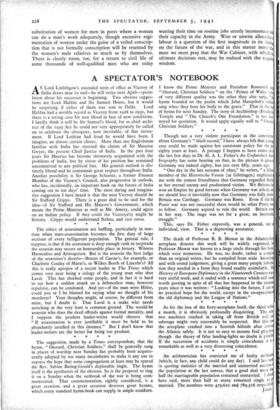A SPECTATOR'S NOTEBOOK
AS Lord Linlithgow's extended term of office as Viceroy of India draws near its end—he will retire next April—specu- lation about his successor is beginning. Two obvious sugges- tions are Lord Halifax and Sir Samuel Hoare, but it would be surprising if either of them was sent to Delhi. Lord Halifax had a notable record as Viceroy from 1926 to 1931, but there is a strong case for new blood in face of new 'conditions. I hardly think it will be Sir Samuel's blood, for as chief archi- tect of the 1935 Act he could not very appropriately be called on to celebrate the obsequies, now inevitable, of that instru- ment. If Lord Lothian had lived he would have been, I imagine, an almost certain choice. More than one Englishman familiar with India has stressed the claims of Sir Maurice Gwyer, the present Chief Justice of India. In the past four years Sir Maurice has become intimately acquainted with the problems of India, but by virtue of his position has remained uncommitted to any political line. His general outlook is dis- tinctly liberal and he commands great respect throughout India. Another possibility is Sir George Schuster, a former Finance Member of the Viceroy's Council, also progressive in outlook, who has, incidentally, an important book on the future of India coming out in ten days' time. The most daring and imagina- tive suggestion I have heard is that the next Viceroy should be Sir Stafford Cripps. There is a great deal to be said for the idea—if Sir Stafford and His Majesty's Government, which means the Prime Minister as well as Mr. Amery, could agree on an Indian policy. If they could the Viceroyalty might be historic. Cripps would understand Nehru, and vice versa.


























 Previous page
Previous page